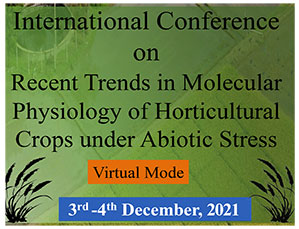- Home
- All Events
- International Conference on Recent Trends in Molecular Physiology of Horticultural Crops under Abiotic Stress

International Conference on Recent Trends in Molecular Physiology of Horticultural Crops under Abiotic Stress
- 03 Dec 2021
- Virtual Mode
- VAIAL
- Brochure
Photo Gallery
News Gallery
The major horticultural crops produced in the world are vegetables, fruits, and flowers. Recently, the importance of abiotic stresses has been gaining attention because many regions of horticultural crop production in the world experience diverse abiotic stresses, including those caused by the global climate change. Abiotic stresses in the form of extreme temperatures, light, humidity, drought, and/or salinity are well-known, and they are associated with a number of morphological, physiological, and biochemical events. The most common stress factors are the easiest for people to identify, but there are many other less recognizable abiotic stress factors which constantly affect the cultural environment. The conference aims to explore and provide more comprehensive approaches that include quantitative and qualitative analyses at the physiological, transcriptome, proteome, and metabolome levels to elucidate the major effects and improvements of abiotic stresses in horticultural plants.

